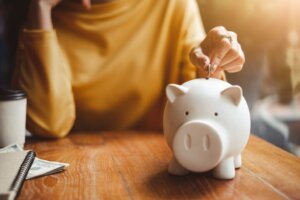How to Continue Enjoying Life in the Current Economic Crisis


Written and verified by the psychologist Valeria Sabater
Inflation is rising. The price of everything is going up, but wages have remained the same, and making ends meet for a good part of society is truly a challenge, along with its associated anguish. Although our needs have remained the same, the resources we have to cover them are gradually decreasing. This causes feelings of threat and anxiety.
Food, fuel, clothing, and services. The current scenario doesn’t only involve a continual increase in prices, but also an economic recession. However, we’re still emerging from the tunnel of instability to which the pandemic subjected us, and we now see ourselves facing a new, equally uncertain horizon. Where does our mental health lie in the midst of this complexity?
Clearly, it’s extremely difficult to currently remain calm and reduce the noise of our negative thoughts. After all, our minds always expect the worst, fanning the fires of anxiety. Can we really be happy in such circumstances? Naturally, we all have our own individual situations to deal with, some better and some worse, but the concern is global.
Let’s look at some basic strategies to help you continue enjoying life in the current economic crisis.
“Wealth consists, not in having great possessions, but in having few wants.”
-Epictetus-

How to continue enjoying life in an economic crisis
It’d be great if money wasn’t so important in our lives, but the truth is that we need it to cover our most basic needs. Abraham Maslow included these in the first two steps of his famous pyramid. For many, economics also defines their status, as well as their integration into their social group by leading the same lifestyle and acquiring the same tools as the other members.
For example, take the individual who, despite having a medium or low salary, invests a good part of their savings in acquiring a top-of-the-range cell phone. Money allows us not only to cover essential aspects such as food or housing but also makes it easier for us to build a certain social identity. That said, now, with our financial freedom limited, many of our goals are being reframed.
Limiting our spending on leisure, material resources, and even certain food products also affects our mental health. Research conducted by the University of Pisa (Italy) claims that in contexts of containment and economic crisis, the appearance of depression among middle-aged men rises.
Bearing this fact in mind, the following question may seem like a contradiction and even an irony, but how can you continue enjoying life in the current economic crisis when everything is more expensive? What kind of mental approach should you apply to deal more adequately with this kind of situation? Actually, you should develop three types of mental approaches.
Despite inflation and economic containment, we mustn’t give up pleasure. We must simply reformulate our sources of well-being. If we focus on the most basic and simple things in life, we’ll feel better.
1. The frugal mindset: when less is more
The frugal mindset defines people who, in addition to saving money, know how to invest their time and take care of their lifestyle habits. Many link this behavior with stinginess. However, they’re completely wrong. In fact, frugal people are great optimizers of their own resources and time. They’re characterized by simplicity.
Let’s look at the pillars on which frugality stands:
- Frugal people are clear about their priorities. To enjoy life when everything is more expensive, you must clarify what the most important thing is in your daily life. There are always superfluous expenses that you can do without. Saving means putting what’s most decisive for your well-being first.
- Your time is valuable. In times of crisis, you might be forced to add more hours to your working day. However, it’s often better to live with less money but enjoy quality time with your loved ones.
- Save and avoid getting into debt. This is possibly the most relevant strategy and the first one you think of when difficult times come.
- Recycle to avoid useless consumption. Recycling, from clothing to technology allows you not only to save money but also helps you save the planet.
Sometimes, instead of obsessing about what the future may bring you, it’s worth taking a step back and staying in the present, in the here and now. Appreciating what surrounds you and what you already have can bring you happiness.
2. The acceptance mentality: adapting to face reality
Inflation has changed our reality. However, if you don’t accept it, you’ll merely be hitting your head against a wall of frustration. Many people had innumerable goals and objectives to meet when the pandemic gave way to normality. However, with the arrival of the crisis, many of these have now faded or been put on hold.
The mindset of acceptance allows you to better navigate adversity and uncertainty. Accepting what can’t be changed means you no longer use magical thinking (“If I want it hard enough, I’ll get it”) which can often result in negative emotional states. In fact, a study conducted by the University of Warsaw (Poland) highlights that acceptance acts as a good emotional regulator. It makes us feel better.

3. The mindset of gratitude: appreciating the simplicity of what surrounds you
If you want to know how to enjoy life in difficult financial times, you must train your eyes and your heart. Start paying attention to the simplest, yet most significant and beautiful realities that surround you. Recover your capacity for wonder and enthusiasm for everything that happens and appears in your daily life, no matter how small.
There are some really basic experiences that don’t cost anything yet make you happy. Indeed, sometimes, when your situation changes due to economic problems, your expectations become simpler and more realistic. This is a good thing. It means lowering your sights and appreciating what you have around you.
Adopting the mentality of gratitude will allow you to enjoy moments with the people you love, go for a walk on the beach, or read a book.
Remember, hard times don’t last forever
Throughout our history as a civilization, crises have been common. Life is cyclical and there are moments of darkness, moments of brightness, and moments of balance and calm. These difficult times, while they may often seem dystopian, dominated as they are by high prices, pandemics, and echoes of wars and great uncertainties will end at some point.
Obviously, we don’t know when they’ll end but, in the meantime, we should avoid processing our days with filters of negativity and catastrophism. Try and take one day at a time. Appreciate the present moment and try to adjust to the circumstances surrounding you. Remember your essential values and don’t lose hope. However, don’t hesitate to ask for specialized help if you need it.
All cited sources were thoroughly reviewed by our team to ensure their quality, reliability, currency, and validity. The bibliography of this article was considered reliable and of academic or scientific accuracy.
-
Frasquilho, D., Matos, M., Salonna, F. et al. Mental health outcomes in times of economic recession: a systematic literature review. BMC Public Health 16, 115 (2015). https://doi.org/10.1186/s12889-016-2720-y
-
Marazziti D, Avella MT, Mucci N, Della Vecchia A, Ivaldi T, Palermo S, Mucci F. Impact of economic crisis on mental health: a 10-year challenge. CNS Spectr. 2021 Feb;26(1):7-13. doi: 10.1017/S1092852920000140. Epub 2020 Apr 7. PMID: 32252843.
- Wojnarowska A, Kobylinska D, Lewczuk K. Acceptance as an Emotion Regulation Strategy in Experimental Psychological Research: What We Know and How We Can Improve That Knowledge. Front Psychol. 2020 Feb 27;11:242. doi: 10.3389/fpsyg.2020.00242. PMID: 32180748; PMCID: PMC7057396.
This text is provided for informational purposes only and does not replace consultation with a professional. If in doubt, consult your specialist.








